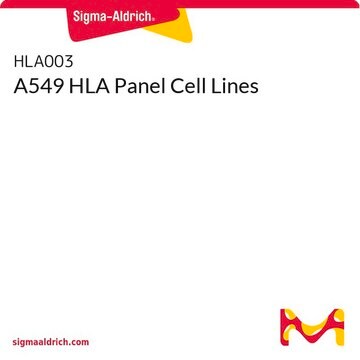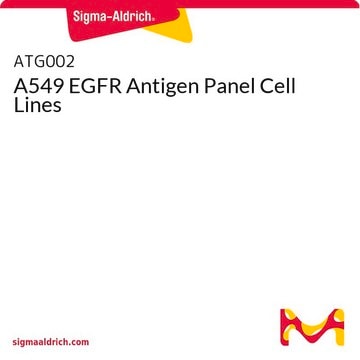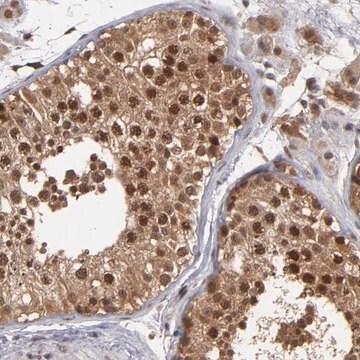CLL1220
Safe Harbor Landing Pad Cell Line A549 Cancer Cells
human male lung (Source Disease: Carcinoma)
Zaloguj sięWyświetlanie cen organizacyjnych i kontraktowych
About This Item
Kod UNSPSC:
41106514
NACRES:
NA.81
Polecane produkty
product name
Safe Harbor Landing Pad Cell Line A549 Cancer Cells,
pochodzenie biologiczne
human male lung (Source Disease: Carcinoma)
Poziom jakości
Postać
frozen liquid (Vial of Frozen Cells)
tryb wzrostu
Adherent
metody
cell culture | mammalian: suitable
Warunki transportu
dry ice
temp. przechowywania
−196°C
Opis ogólny
The STR profile of this cell line matches that of its parental cell line ATCC® Catalog No. CCL-185a. A549 is a human lung carcinoma cell line isolated in 1972 from a lung tumor of a male patient suffering from carcinoma.
Opis linii komórkowej
These cells are a human lung carcinoma cell line isolated from a lung tumor of a 58-year old male suffering from carcinoma. The cells possess a hypotriploid karyotype and express EGFR and mutant KRAS.
Zastosowanie
This product is a human A549 adenocarcinoma cell line in which a landing pad cassette has been integrated into the AAVS1 safe harbor locus using CompoZr®Zinc Finger Nuclease technology. The mKATE2 fluorescence gene was integrated following the EF1a promoter and flanked by unique Cre-lox sites. The design of this landing pad cassette allows for easy, fast, and affordable genetic modification using Cre recombinase. mKATE2 can easily be exchanged for a payload of the user′s choice using Cre recombinase and a targeting vector with appropriate lox sites. Cells can then be sorted via fluorescence-activated cell sorting (FACS) for loss of mKATE2 expression as a surrogate for successful integration of the targeting vector. Approximately 7-10 days are required for loss of the mKATE2 signal in successfully targeted cells. See technical bulletin for detailed protocols.
Cechy i korzyści
These cells contain the mKATE2 fluorescence gene flanked by unique Cre-lox sites inserted in the AAVS1 safe harbor gene. These A549 cells are adherent with a doubling time of approximately 22 hours.
Jakość
Tested for Mycoplasma, bacterial and fungal content, post-freeze viability, short terminal repeat (STR) analysis for cell line identification.
pożywka hodowlana
RPMI modified to contain 2mM L-glutamine, 10mM HEPES, 1mM sodium pyruvate, and 1500mg/L sodium bicarbonate. Add 10% FBS(Catalog Number F2442).
Informacje prawne
ATCC is a registered trademark of American Type Culture Collection
CompoZr is a registered trademark of Merck KGaA, Darmstadt, Germany
This page may contain text that has been machine translated.
Kod klasy składowania
10 - Combustible liquids
Klasa zagrożenia wodnego (WGK)
WGK 3
Temperatura zapłonu (°F)
Not applicable
Temperatura zapłonu (°C)
Not applicable
Certyfikaty analizy (CoA)
Poszukaj Certyfikaty analizy (CoA), wpisując numer partii/serii produktów. Numery serii i partii można znaleźć na etykiecie produktu po słowach „seria” lub „partia”.
Masz już ten produkt?
Dokumenty związane z niedawno zakupionymi produktami zostały zamieszczone w Bibliotece dokumentów.
Huseyin Tas et al.
PloS one, 10(9), e0136963-e0136963 (2015-09-04)
We describe an optimized system for the easy, effective, and precise modification of the Escherichia coli genome. Genome changes are introduced first through the integration of a 1.3 kbp Landing Pad consisting of a gene conferring resistance to tetracycline (tetA)
Zhong-Wei Du et al.
Stem cells (Dayton, Ohio), 27(5), 1032-1041 (2009-05-06)
To circumvent the silencing effect of transgene expression in human embryonic stem cells (hESCs), we employed the Cre recombination-mediated cassette exchange strategy to target the silencing-resistant site in the genome. We have identified new loci that sustain transgene expression during
Kimi Araki et al.
Nucleic acids research, 30(19), e103-e103 (2002-10-05)
The Cre-lox system is an important tool for genetic manipulation. To promote integrative reactions, two strategies using mutant lox sites have been developed. One is the left element/right element (LE/RE)-mutant strategy and the other is the cassette exchange strategy using
Nasz zespół naukowców ma doświadczenie we wszystkich obszarach badań, w tym w naukach przyrodniczych, materiałoznawstwie, syntezie chemicznej, chromatografii, analityce i wielu innych dziedzinach.
Skontaktuj się z zespołem ds. pomocy technicznej








